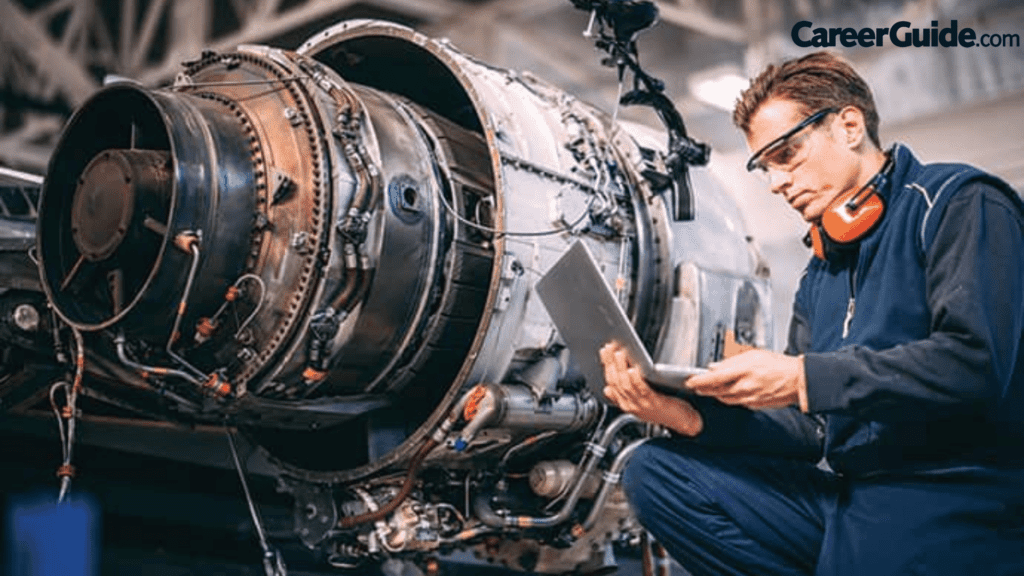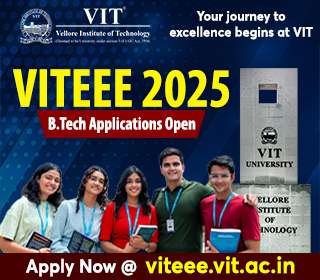The design, development, and manufacture of aeroplanes, spacecraft, and related systems constitute the exciting and quickly developing area of aerospace engineering. For people who are enthusiastic about aviation, space exploration, and cutting-edge technology, it offers a wide range of job options.
Aerospace engineers take part in cutting-edge projects, work with diverse teams, and enhance aerospace technologies, propulsion systems, and space missions. A career in aeronautical engineering offers a rewarding and active road for people with a solid foundation in mathematics, physics, and engineering concepts due to its excellent growth prospects and widespread demand.
download Universities/colleges cutoff
What is Aerospace Engineering?

This engineering field is focused on designing and building machines capable of flying. Due to technological evolvement, there was advancement in designing commercial and military aircrafts such as powered lighter-than-air craft, fixed-wing aeroplanes, jets, auto-gyros, gliders and helicopters.
ENTRANCE EXAM QUESTIONS
These engineers usually develop aircraft, spacecraft, satellites and missiles. They initially create and test the prototypes and make sure that they function according to the design made.
Responsibilities
An Aerospace Engineer typically has the following duties:
- Directing and coordination of design, manufacturing and testing of aircraft and aerospace products with safety and security features.
- Assessment of project proposals and ensuring the technical and financial feasibility.
- Evaluation of project designs for ensuring if those products meet the engineering principles, customer requirements and environmental regulations.
- Regular inspection for malfunctioning or damaged products and identification of problem sources and their solutions.
- Designing various complex systems like spacecraft, aircraft, missiles and weapon systems and ensuring their systems function properly and managing the control systems.
- Development of new technologies to be used in aircraft or aerospace engines related to navigation, instrumentation and communication; robotics; and propulsion and combustion.
NIRF top engineering colleges 2023
Education and Eligibility
Education Level |
Eligibility Criteria |
|---|---|
| Bachelor’s Degree | – Completion of high school education or equivalent |
| – Strong foundation in mathematics and physics | |
| – Entrance exams: Typically requires qualifying exams | |
| such as JEE Main (India) or equivalent | |
| – Duration: 4 years | |
| Master’s Degree | – Bachelor’s degree in Aerospace Engineering or related |
| field with a satisfactory GPA | |
| – Entrance exams: Some universities may require | |
| qualifying exams such as GATE (Graduate Aptitude Test | |
| in Engineering) | |
| – Duration: 2 years or more, depending on the program | |
| Ph.D. | – Master’s degree in Aerospace Engineering or related |
| field | |
| – Research proposal and/or interview may be required | |
| – Duration: Typically 3-5 years, depending on research | |
| progress and completion of a dissertation |
download Universities/colleges cutoff
Required Skills
A successful Aerospace Engineer should possess the following skillset.
Required Skills | Description |
|---|---|
| Strong Analytical | Ability to analyze complex problems and develop logical and |
| and Problem- | innovative solutions. |
| Solving Skills | |
| Mathematical | Proficiency in advanced mathematics, including calculus, |
| Aptitude | differential equations, linear algebra, and numerical |
| methods. | |
| Knowledge of | Understanding of the principles of physics and their |
| Physics | application in aerospace engineering, including mechanics, |
| thermodynamics, and electromagnetism. | |
| Technical | Proficiency in using computer-aided design (CAD) software |
| Competence | and other engineering tools for design and analysis tasks. |
| Familiarity with programming languages such as MATLAB, | |
| Python, or C/C++ is beneficial. | |
| Communication | Strong verbal and written communication skills to convey |
| Skills | technical information effectively to team members and |
| stakeholders. | |
| Teamwork and | Ability to work collaboratively in multidisciplinary teams |
| Collaboration | and contribute effectively to achieve project objectives. |
| Adaptability and | Willingness to adapt to new technologies, industry |
| Continuous | advancements, and changing project requirements. |
| Learning | |
| Attention to | Detail-oriented mindset to ensure precision and accuracy |
| Detail | in design, calculations, and analysis. |
| Problem | Ability to identify and address problems or challenges in |
| Identification | aerospace engineering projects. |
| and Resolution | |
| Creativity | Capacity to think creatively and innovate in designing |
| solutions and optimizing aerospace systems. | |
| Time Management | Effective time management skills to meet project deadlines |
| and manage multiple tasks efficiently. | |
| Organization |
ENTRANCE EXAM QUESTIONS
Top Colleges to study Aerospace Engineering
The following are some of the top colleges that offer courses in Aerospace Engineering.
- Indian Institute of Technology, Mumbai.
- Lovely Professional University (LPU).
- Indian Institute of Space Science and Technology, Thiruvananthapuram.
- Birla Institute of Technology, Ranchi.
- Defense Institute of Advanced Technology, Pune.
- Flytech Aviation Academy, Secunderabad.
- Guru Nanak Engineering College, Hyderabad.
NIRF top engineering colleges 2023
Employment Industries for Aerospace Engineers
The Aerospace Engineers can find get employed in different industries or sectors like:
Employment Industries | Description |
|---|---|
| Aerospace Manufacturing | Working in companies involved in the design, development, |
| and production of aircraft, spacecraft, and related systems. | |
| Defense and Military | Employed in defense organizations for the design, testing, |
| and maintenance of military aircraft and defense systems. | |
| Research and Development | Engaged in research institutions and organizations to |
| develop new technologies and advance aerospace knowledge. | |
| Government Agencies | Working in government agencies such as space agencies, |
| aviation departments, and regulatory bodies. | |
| Airlines and Aviation | Employed by airlines for aircraft maintenance and |
| performance optimization. | |
| Consulting | Working in consulting firms that provide specialized |
| aerospace engineering services to various clients. | |
| Education and Academia | Employed as professors or researchers in educational |
| institutions, teaching and conducting aerospace engineering | |
| research. | |
| Space Industry | Engaged in the growing private space industry, including |
| companies focused on satellite development, space tourism, | |
| and exploration. | |
| Automotive Industry | Employed in the automotive sector, particularly in the |
| development of aerospace-related technology for vehicles. | |
| Energy and Power | Working on aerospace technology applications for energy |
| generation, such as wind turbines and solar power systems. |
download Universities/colleges cutoff
Job Profiles
An Aerospace Engineer can be employed in any role mentioned below:
- Aerospace designer checker
- Aircraft production managers
- Mechanical design engineers
- Assistant technical officers
- Thermal design engineers
Top recruiters of Aerospace Engineers
The following are some of the leading organizations that employ Aerospace Engineers:
Top Recruiters | Description |
|---|---|
| Boeing | One of the world’s largest aerospace manufacturers and |
| defense contractors, specializing in commercial and military | |
| aircraft. | |
| Airbus | Prominent European aerospace corporation engaged in the |
| design, manufacture, and sale of commercial aircraft. | |
| Lockheed Martin | Global security and aerospace company specializing in |
| advanced technology systems for defense and space sectors. | |
| NASA | The United States’ space agency, involved in space |
| exploration, research, and technology development. | |
| SpaceX | Private American aerospace manufacturer and space |
| transportation company known for its advanced rocket systems. | |
| Rolls-Royce | Global provider of aerospace engines, systems, and services |
| for commercial and defense markets. | |
| General Electric (GE) | Diversified technology and manufacturing company involved |
| in various sectors, including aviation and aerospace. | |
| Honeywell | Multinational conglomerate offering aerospace and defense |
| products and services, including aircraft engines and systems. | |
| Northrop Grumman | American global aerospace and defense technology company |
| involved in areas such as military aircraft and space systems. | |
| Safran | French multinational aerospace and defense company |
| specializing in aircraft engines, propulsion, and equipment. |
download Universities/colleges cutoff
Salary and Career Outlook
In India, the average yearly salary of an Aerospace Engineer is more than INR 6 LPA. An IIT graduate can expect to earn an average salary of INR 15 LPA yearly. In the US, the average annual salary is $107,700. These salaries are dependent on experience and higher education.
ENTRANCE EXAM QUESTIONS
The demand for Aerospace engineers will be more as Industry 4.0 will need more engineers, technicians and operators in Aerospace Engineering. The aircraft are being redesigned to produce less pollution with better fuel efficiency that will help in sustaining demand for research and development.
There are ample opportunities for Aerospace Engineers in various domains like R&D of aircraft, maintenance, monitoring and quality control for the handling of rocket and rocket launchers.
Frequently Asked Questions
Because it combines the difficulties of engineering and the excitement of space exploration, aerospace engineering is fascinating.
Yes, a career in aerospace engineering offers rewarding prospects for growth, creativity, and involvement in the progress of aviation, space exploration, and defence technologies.
Innovative technology, strict safety regulations, international cooperation, and the exploration of uncharted territories outside of Earth’s atmosphere are just a few of the aerospace industry’s distinctive traits.
To be able to develop, analyse, and create in the discipline of aerospace engineering, engineers must have a deep understanding of the fundamental laws and principles that control the behaviour of aircraft, spacecraft, and related systems.













